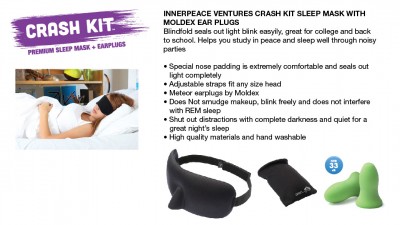Michael: Innerpeace Ventures
While Michael’s summer job was not technically an internship, it required the same level of drive and hard work as one—and it’s simply too cool not to write about. Most Oakwood students first realized that Michael had started his own company when he texted them over the summer, asking them to buy his product on Amazon. Following the link that he included led to a completely legitimate Amazon company named Innerpeace Ventures, which sold two products: The Chillbox and The Crash Kit.
The Chillbox contains twenty pairs of earplugs, and the Crash Kit contains ten pairs of earplugs and a sleep mask. But how on earth did an almost-eighteen-year-old create a company in less than a summer? Michael explains that his family helped him get started. His aunt had started an Amazon company that manufactured sleep masks, and she asked him if he wanted to do the same. “It seemed really interesting, so I took her up on it,” Michael says good-naturedly.
As for the earplugs, Michael’s father owns a factory in Culver City that makes earplugs. Michael helped out there over the summer and was able to get some of the excess earplugs free of charge. He still had a long way to go, though, before Innerpeace Ventures was a successful company.
Michael needed to get his product recognized. He tells me that his marketing strategy was to give his earplugs and eye masks “a younger vibe” and market them to college students: a demographic that may want some peace and quiet in the midst of hectic residential life. He worked towards this image through packaging and Amazon images, which show a girl playing an electric guitar and a young man wearing earplugs as he works in a crowded computer lab. Mike also needed to make his product relevant on Amazon.
He says, “I looked at a lot of Amazon tutorials and learned how to play the game.” One key component of this game is the concept of “action.” Action encompasses the number of clicks, views, sales, and reviews a product has, and as Michael explains, action begets more action. “The more action you have on a product in a short amount of time means the higher it’s going to move up when searched,” which is essential for a product to get found and eventually bought.
How did Michael get action? His plan was to ask friends to buy and review his product, promising to reimburse them for the essential service they did for Innerpeace Ventures. After a week and half, Michael already had strangers buying the Chillbox. He recalls his excitement when he got his first sale from a non-Oakwooder, a buyer in Massachusetts. “Last week, I had one day when I sold fifteen to random people,” Michael tells me.
What’s the biggest thing he learned about starting a company? “That it’s not as hard as people make it,” Michael says candidly. “Amazon makes it really convenient: I can make money sitting at home and editing things on the computer.”
Innerpeace Ventures is obviously a hit—but how much money is Michael actually making? If you’re worried that Michael is becoming an evil, greedy CEO, you can breathe freely. After Amazon takes 15% for its third-party services, Michael says that he gives half of his product to his mom’s foundation, a nonprofit organization in Romania that puts orphans through college.





